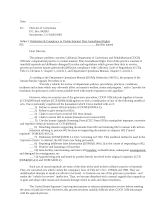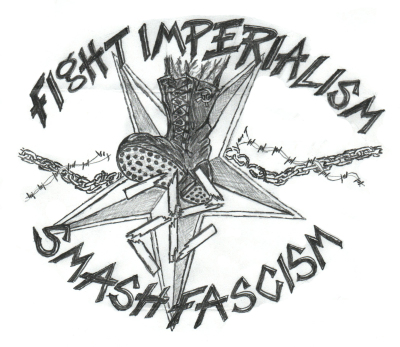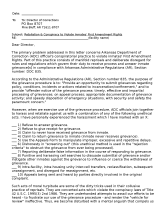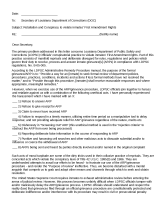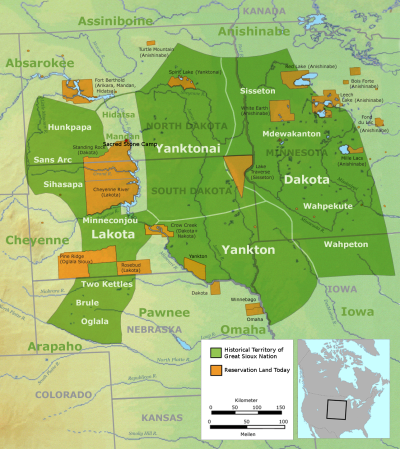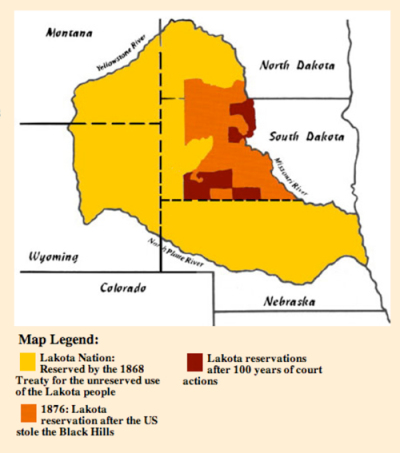
On Cardinal Principles
In the last year there’s been some struggle over MIM(Prisons)’s six main points. This is a good thing, as it indicates emerging Maoist cells trying to reconcile what does and should unite us. The focus of issue 54 of Under Lock & Key is tactics. Tactics are not what unite us. Tactics is the realm where we need many cells trying many different things. Tactics are guided by line and strategy, but are much more flexible over shorter time periods and therefore require creativity that is in touch with the masses.
Marxism-Leninism-Maoism, or Maoism for short, is MIM(Prisons)’s political line. Maoism does not tell us whether putting money into one big advertisement or thousands of little fliers will have the greater effect. Maoism also doesn’t tell us whether a hunger strike will be more effective than a legal battle. These are tactical questions.
Dividing Lines or Dividing Over Tactics
In the last year, a cell that we considered part of the broader Maoist Internationalist Movement (MIM) split with MIM(Prisons) over what we saw as a tactical question. Maoists should never split over tactical questions; this is the theoretical importance of distinguishing between line, strategy and tactics.
We pushed this cell to present their split in terms of ideological line in relation to our six main points. The response was that they uphold the six main points but believe there are other issues to split over, such as promoting white supremacy, which they accused MIM(Prisons) of doing. They came to this conclusion after MIM(Prisons) did not print a statement criticizing the actions of prison activists that we have no affiliation with. This cell had a history of working closely with MIM(Prisons) over many years. And despite all the work we have done in that time (work that they admit challenged white supremacy) they were willing to split with us over this one action (or lack of action).
We see this as an error in how one should assess other cells. A cell, just as an individual, should be assessed on the whole. If a cell has acted according to one line for years, but did one thing that you see as violating that line, you probably should not split with that cell. That would be an ultra-left error, because you are expecting others to be perfect. Once it has been established by a pattern of actions that a cell has shifted its line and violated cardinal principles, then it would be correct to stop working with and possibly publicly criticize that cell.
In this particular case, MIM(Prisons) was condemned, not for participating in an event perceived to be white supremacist in nature, but for not condemning it. In contrast, MIM(Prisons) would argue that in most cases even if we had participated in this one event, that would still not be sufficient reason to split. You might publicly condemn the event yourself, but this should not rise to the level of creating splits in the Maoist Internationalist Movement. Willingness to split over non-cardinal issues is a threat to our ability to consolidate our forces in this country where individualism and splitism prevail. (To clarify, division of labor into collaborating cells is not the same as a split.)
If a cell does promote a campaign that caters to white nationalism, then one should criticize that based on our 4th point on the First World labor aristocracy being a force for imperialism, and as a violation of the Maoist line that oppressed nations have a right to self-determination. As anti-imperialists, supporting the labor aristocracy and undermining oppressed-nation self-determination is a no no. And a consistent practice of doing this indicates an underlying incorrect line that is a cause for splitting.
Principles of Line or Strategy?
Another MIM cell recently questioned why MIM(Prisons) put forth 6 points, adding on to the 3 cardinal principles that have historically defined the MIM.(see p. 2 of ULK) While we do present our 6 points in place of the 3 cardinals, it was not necessarily to say that the 3 cardinals were insufficient to define who is a communist. However, we must admit that we created confusion there.
The origin of our 6 main points is twofold. Our first goal with the six main points was to distinguish ourselves in the eyes of our readers. We were frustrated with the countless letters from people telling us to work with other groups, stop criticizing other groups and just unite around our common fight for justice. We wanted to succinctly differentiate ourselves from the countless organizations out there. Point 1 separates us from the Liberals, and in point 2 we split from the anarchists. Neither of those points were necessary in MIM’s 3 cardinals, because all those claiming to be communists already agree on those two points. Point 3 separated us from the Trotskyists and neo-Trostkyists whose idealism leads them to unite with the petty-bourgeoisie in the First World while criticizing the bourgeois forces in the Third World even when they are fighting against imperialism. Points 4-6 are essentially the MIM cardinals.
While the 3 cardinals, as MIM came to refer to them, are nice and succinct dividing line points, they originally appeared in a greater context of a piece entitled “Who is a communist?” in the second edition of What is MIM?, which discusses concepts like “the abolition of power of people over people,” “a communist party… is necessary,” “democratic centralism,” and “general unity with all other groups and outbreaks against imperialism.”
The second contextual thing to understand about our 6 points is that they were developed in the early years of our organization, when those in the MIM camp were figuring out how to relate to each other as separate cells/organizations. It was also a period of fierce struggle against those promoting a third way in the post-9/11 Middle East, while framing the struggles there as “McWorld vs. Jihad.” Therefore, our point 3 became, in the eyes of many organizations at that time, a dividing line question. The original MIM comrades, in fact, pushed this line hard to expose revisionists allying with the U.$. state department. While it is often tied up with the labor aristocracy question, it stands alone as its own point.
Mao’s practice on building the united front of classes in oppressed countries, and eir theoretical writings on this topic contributed to our line on the subject and the development of point 3. We can also take lessons from the rectification movement of the Communist Party of the Philippines to find universal line lessons on united front building. However, in practice, who to form united fronts with is really a strategic question, as the answer may change as the strategic stage of struggle changes.
Mao’s contribution on united front work was based on the assessment of the principal contradiction being between the oppressed nations and imperialism. Some seventy years later, we can say this is still the situation. But someday it will change. That is what makes our point 3 a strategic question and not a universal line question. From the early days of MIM, differences on the assessment of the principal contradiction have been a primary point of criticism MIM made of revisionist parties. That said, MIM never said the principal contradiction or united front was a cardinal principle.
In our point 2, we point out the need for a Joint Dictatorship of the Proletariat of the Oppressed Nations (JDPON) in order to implement socialism in the imperialist countries. This is MIM Thought, a logical application of MIM’s line on the labor aristocracy to the universal communist principle of the need for a dictatorship of the proletariat. It is also a strategy question, that does not necessarily have universal application.
Who Defines the Cardinals?
“The materialist approach to cardinal principles stresses an examination of actual history, not just our own vivid imaginations of how the world SHOULD BE. We materialists do not take splitting the proletariat and its vanguard party lightly. We form only as many cardinal principles as are necessary to unmask the enemy’s attempts to infiltrate us or divert us to a less efficient road to communism.” - MC5(1)
The cell structure complicates things further. For with a centralized organization MIM could say that if you agree on these three points and the need for a party then you should join ours. Then you are obligated to accept our other lines until you convince the party to change them. With many small cells there is not democratic centralism on line in this way, and we could see many disagreements on many non-cardinal issues. This could lead to confusion and division in the movement. Therefore we caution all MIM cells to carefully think out their positions before disagreeing with historical MIM line and the lines of other contemporary cells.
At the same time, we must not hold dogmatically to MIM Thought frozen in time of 2006 or earlier. The three cardinals themselves evolved over the years of the original MIM. While MIM formed in 1983, they did not get serious about the third cardinal until 1987.(2) In the MIM Notes archive, which is incomplete for these early years, it is issue 42 from June 1990 when we first see the 3 cardinals presented as such. However, the paper version of issue 42 does not feature the 3 cardinals, so this seems to have been added to the web version after the fact. MIM Notes Issue 50 (March 1991) does have the 3 cardinals listed in the paper version. In 1999, MIM expanded the 3rd cardinal to include reference to Marx, Engels and Lenin, describe the oppressor nation labor aristocracy as a petty bourgeois class and specifically list which countries this line applies to.(3)
In practice, MIM used the 3 cardinal principles to determine fraternal status.(4) This came up most strongly when it decided that the third cardinal applied internationally and not just to First World parties, thus cutting its direct promotion of some who were practicing People’s War in the Third World. This began with the “Resolution on defending cardinal principles in international context,” 2002, but it was sometime after 2002 when MIM actually stopped any promotion of those parties.
Building MIM Today
MIM(Prisons) was announced as a MIM cell on 8 October 2007. To this day we often refer to “Maoism Around Us,” published in May 2009, when discussing these issues. This was one of what could be considered the founding documents of MIM(Prisons). While our ideology was already represented in the expansive work of MIM, in that article we addressed the situation we found ourselves in as the original centralized organization of MIM had ceased to exist. In it we pointed out that the MIM lives on, by the same definition as it always has. We continued to print MIM’s 3 cardinal principles in most issues of Under Lock & Key.
It was after our first official congress in July of 2010 that MIM(Prisons) put out our six main points. Since then we have referred to them as our “cardinal points” once or twice, and printed them in every issue of ULK with a similar tagline as we once printed MIM’s three cardinals: “MIM(Prisons) distinguishes ourselves from other groups on the six points below.”
As we’ve said before, we need more Maoist Internationalist cells. Topical cells that focus on gender, ecology and the environment, and anti-militarism are all good candidates. And there is an endless need for locality-based cells that focus on local recruitment and building around popular movements in the region that align with the interests of the Third World proletariat. But us saying this does not make them appear out of thin air. As we gain small victories in recruiting comrades outside prisons, we wonder if the MIM needs institutions that can allow those who agree on the 3 cardinals to join up in a meaningful way. A way that provides coordination without sacrificing security, independent initiative and other benefits of the cell structure. Six months ago we set up the subreddit /r/mao_internationalist “to help individuals and groups allied with the Maoist Internationalist Movement support each others’ work.” Maybe it is time to refocus on the 3 cardinals and push for a regroupment of MIM.
There are United Struggle from Within (USW) cells that might as well be considered MIM cells due to their advanced political practice. And there are prison-based cells that are in the MIM camp that are not USW, which are usually nation-based. We support the nation-based organizing strategy as a reason to form a new organization separate from USW. There is probably no tactical advantage to identifying prison-based cells as MIM cells, because of the repression in the prison environment, although there is obvious theoretical advantage in summarizing a group’s line and practice.
Being in prison limits one’s ability to coordinate with other cells without relying on MIM(Prison). For our own organization, MIM(Prisons) does not accept prisoners as members because it is not possible to have democratic centralism when all our mail is read by state employees. When coordinating between cells, we need to make similar considerations.
In most contexts that we are aware of, MIM(Prisons) is seen as the foremost cell representing the MIM today. While we are honored by that recognition, it is also a sign of how far we have to go. Discussion of party formation is no more relevant today than it was ten years ago when our organization just formed. If we cannot get more than a handful of cells putting in work at the level that MIM(Prisons) does, how can we build a Maoist Party? And what good would such a party do? There is no question of seizing power in the United $tates today, where MIM(Prisons) is based. But there is much work to do to prepare for that inevitability as the imperialists overextend themselves militarily and the Third World continues to strike blows against them.
Related Articles:This article referenced in:








